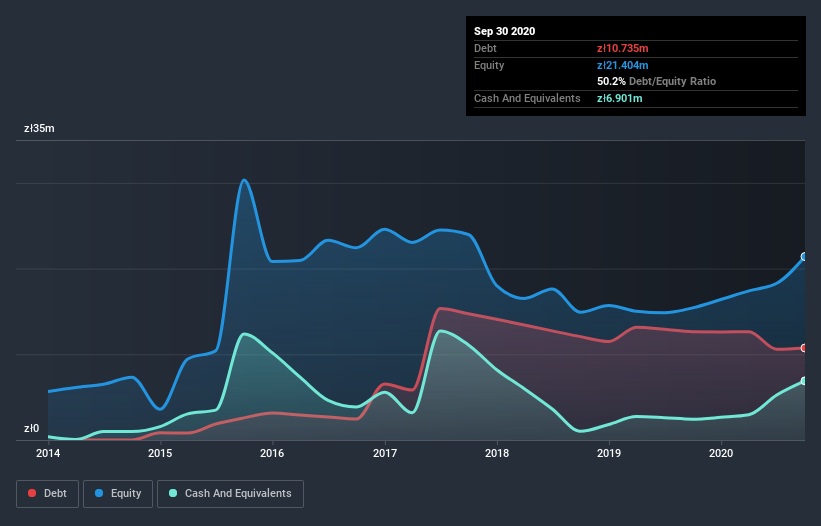The external fund manager backed by Berkshire Hathaway's Charlie Munger, Li Lu, makes no bones about it when he says 'The biggest investment risk is not the volatility of prices, but whether you will suffer a permanent loss of capital.' So it might be obvious that you need to consider debt, when you think about how risky any given stock is, because too much debt can sink a company. Importantly, Vivid Games S.A. (WSE:VVD) does carry debt. But is this debt a concern to shareholders?
When Is Debt Dangerous?
Debt and other liabilities become risky for a business when it cannot easily fulfill those obligations, either with free cash flow or by raising capital at an attractive price. If things get really bad, the lenders can take control of the business. While that is not too common, we often do see indebted companies permanently diluting shareholders because lenders force them to raise capital at a distressed price. By replacing dilution, though, debt can be an extremely good tool for businesses that need capital to invest in growth at high rates of return. When we think about a company's use of debt, we first look at cash and debt together.
Check out our latest analysis for Vivid Games
What Is Vivid Games's Debt?
As you can see below, Vivid Games had zł10.7m of debt at September 2020, down from zł12.6m a year prior. On the flip side, it has zł6.90m in cash leading to net debt of about zł3.76m.

How Strong Is Vivid Games's Balance Sheet?
According to the last reported balance sheet, Vivid Games had liabilities of zł14.3m due within 12 months, and liabilities of zł7.57m due beyond 12 months. On the other hand, it had cash of zł6.90m and zł3.76m worth of receivables due within a year. So its liabilities outweigh the sum of its cash and (near-term) receivables by zł11.2m.
While this might seem like a lot, it is not so bad since Vivid Games has a market capitalization of zł51.5m, and so it could probably strengthen its balance sheet by raising capital if it needed to. But it's clear that we should definitely closely examine whether it can manage its debt without dilution.
In order to size up a company's debt relative to its earnings, we calculate its net debt divided by its earnings before interest, tax, depreciation, and amortization (EBITDA) and its earnings before interest and tax (EBIT) divided by its interest expense (its interest cover). This way, we consider both the absolute quantum of the debt, as well as the interest rates paid on it.
While Vivid Games's low debt to EBITDA ratio of 0.87 suggests only modest use of debt, the fact that EBIT only covered the interest expense by 5.1 times last year does give us pause. So we'd recommend keeping a close eye on the impact financing costs are having on the business. We also note that Vivid Games improved its EBIT from a last year's loss to a positive zł3.7m. There's no doubt that we learn most about debt from the balance sheet. But you can't view debt in total isolation; since Vivid Games will need earnings to service that debt. So if you're keen to discover more about its earnings, it might be worth checking out this graph of its long term earnings trend.
Finally, a company can only pay off debt with cold hard cash, not accounting profits. So it is important to check how much of its earnings before interest and tax (EBIT) converts to actual free cash flow. During the last year, Vivid Games generated free cash flow amounting to a very robust 97% of its EBIT, more than we'd expect. That positions it well to pay down debt if desirable to do so.
Our View
Happily, Vivid Games's impressive conversion of EBIT to free cash flow implies it has the upper hand on its debt. And the good news does not stop there, as its net debt to EBITDA also supports that impression! Looking at all the aforementioned factors together, it strikes us that Vivid Games can handle its debt fairly comfortably. On the plus side, this leverage can boost shareholder returns, but the potential downside is more risk of loss, so it's worth monitoring the balance sheet. When analysing debt levels, the balance sheet is the obvious place to start. But ultimately, every company can contain risks that exist outside of the balance sheet. Case in point: We've spotted 4 warning signs for Vivid Games you should be aware of.
If you're interested in investing in businesses that can grow profits without the burden of debt, then check out this free list of growing businesses that have net cash on the balance sheet.
If you decide to trade Vivid Games, use the lowest-cost* platform that is rated #1 Overall by Barron’s, Interactive Brokers. Trade stocks, options, futures, forex, bonds and funds on 135 markets, all from a single integrated account. Promoted
New: Manage All Your Stock Portfolios in One Place
We've created the ultimate portfolio companion for stock investors, and it's free.
• Connect an unlimited number of Portfolios and see your total in one currency
• Be alerted to new Warning Signs or Risks via email or mobile
• Track the Fair Value of your stocks
This article by Simply Wall St is general in nature. It does not constitute a recommendation to buy or sell any stock, and does not take account of your objectives, or your financial situation. We aim to bring you long-term focused analysis driven by fundamental data. Note that our analysis may not factor in the latest price-sensitive company announcements or qualitative material. Simply Wall St has no position in any stocks mentioned.
*Interactive Brokers Rated Lowest Cost Broker by StockBrokers.com Annual Online Review 2020
Have feedback on this article? Concerned about the content? Get in touch with us directly. Alternatively, email editorial-team (at) simplywallst.com.
About WSE:VVD
Slight risk with mediocre balance sheet.
Market Insights
Community Narratives




